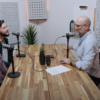Not Your Grandma’s Sunday School
What if your church had a different way of doing adult Sunday school?
For some, this idea is unthinkable. According to grandma, Sunday school has been a standard in church life since the days of Adam and Eve. To exchange it for a new and flashy trend would, at the least, be considered a travesty. What would we do without fresh coffee and a place for us to share our opinion about what the Bible means? How could we ever have true fellowship if we traded in our discussion hour for something else? How would young adults meet other young adults or how would those gray-haired saints find encouragement to keep pressing on toward heaven?
These are all valid questions, and they reflect a deep love for a system that has and will continue to bless many people. But if the traditional form of Sunday school is indeed a beloved blessing, then why propose an alternative?
YOU’VE GOT 3 TO 5 YEARS
Imagine if a member of your church came to you and said, “You’ve got me for 3 to 5 years before my job will take me elsewhere. Teach me everything I need to know.” What would you do with that person? You know he or she will hear good expositional preaching from the pulpit weekly, but how would you use the “Sunday school hour” to equip, encourage, and exhort them toward Christian maturity?
That scenario is exactly what we face in our church. Due to the transience of our city, most people are part of our congregation for roughly 3 to 5 years. In light of this, we’ve developed an intentional curriculum we call Core Seminars.
HOW IT WORKS
This is how it works on any given Sunday morning: Everyone assembles together at 9:30 to hear a brief description of the classes that will be taught that morning. After this, people break and head to the class of their choosing to listen to a 45-minute lecture about a particular area of the Christian life. During the lecture there are usually a few opportunities to ask questions, but for the most part, people listen and take notes. When it’s all over, everyone gathers upstairs for the Sunday morning worship service.
That’s what Sunday morning feels like. But here’s the larger structure:
- At present, we have 24 different courses, most of which are 13 weeks long.
- The lessons are grouped into 6 major tracks: Membership Matters, Christian Basics, Bible Overview, History and Theology, Christian Life, and Christian Growth.
- These tracks are designed to be taken in this order, but anyone can jump in at any time and still benefit.
- Each semester we offer 8 different classes. At least one class is offered from each track.
- The lessons for each class have been written in full manuscript form over the course of a decade by elders, staff, and laymen.
- The lessons are taught by some of those same men, but also by other laymen in our church. This format provides a good opportunity for emerging teachers and leaders to grow.
- We have an elder who oversees all the content in those manuscripts and the quality of the teaching.
- The classes are attended primarily by people 7th grade and up. We offer Bible-focused classes for children 6th grade and under.
- Download our Core Seminar brochure to learn more.
At first glance, this might sound like a pretty unattractive alternative to the traditional model. Who wants to sit and listen to a lecture about theology? Who wants to have one person yack for an hour in the place of the community contributing? Who wants to share a classroom with people who aren’t in their same stage of life? You’d be surprised. In fact, when the Lord calls someone away from our church, it’s not uncommon for them to point to Core Seminars as a major instrument God used to help them grow in maturity.
WHAT ABOUT FELLOWSHIP?
Having heard all of this, the question about fellowship may still be lingering for you. One of the strengths of the traditional model is that it often facilitates Christ-honoring relationships. While this may be true, I’d like to suggest that we shouldn’t rely too heavily on a one-hour meeting on Sunday morning to cultivate that kind of fellowship.
Instead, the life of the church throughout the week should be devoted to building deep, authentic, gospel-centered relationships. In our church, we call it a culture of discipling. This means that our members are committed to actively, intentionally, and prayerfully applying the gospel to each other’s lives on a daily basis. The Core Seminars only help to fuel this.
How? The theological training received in the Core Seminar flows over into the relationships within our church. Also, we encourage people to take younger Christians through the Core Seminar program with them, and then discuss the lessons together. The truths people learn characterize their conversations and the application of those truths becomes the focus of their service together.
While there is no system that is perfect, the Core Seminar model is certainly a worth consideration. And you never know, even Grandma might be blessed by it.









